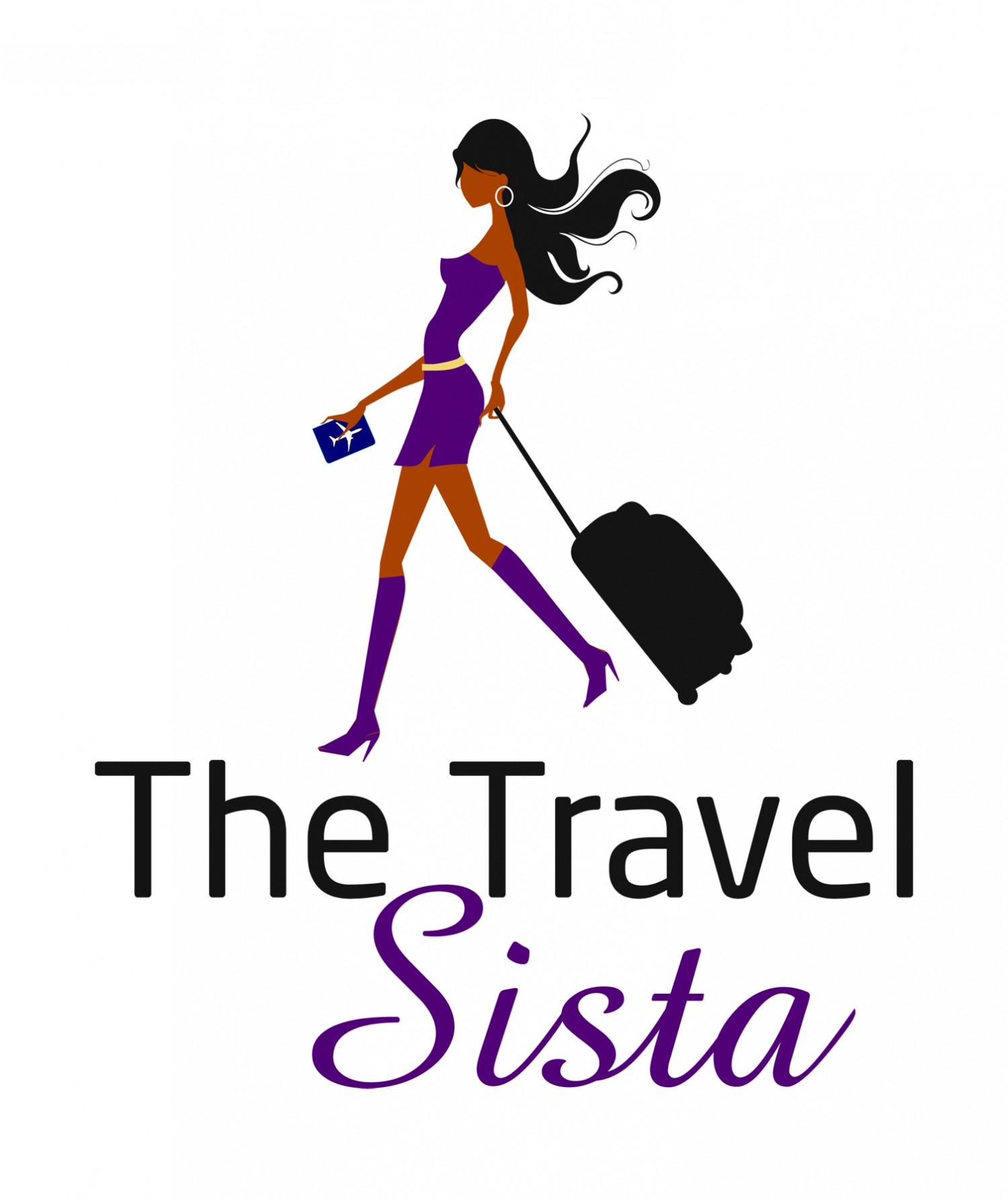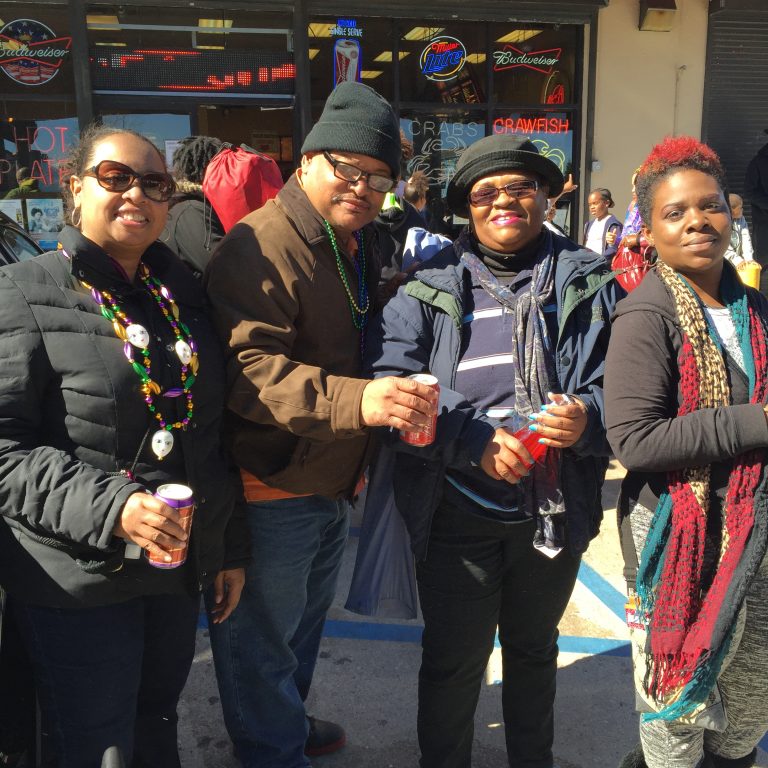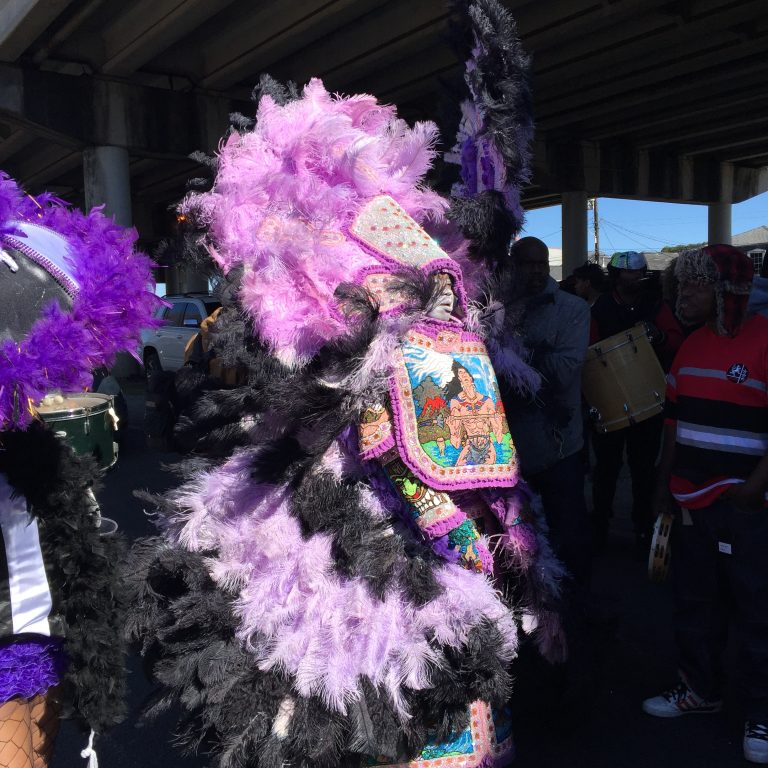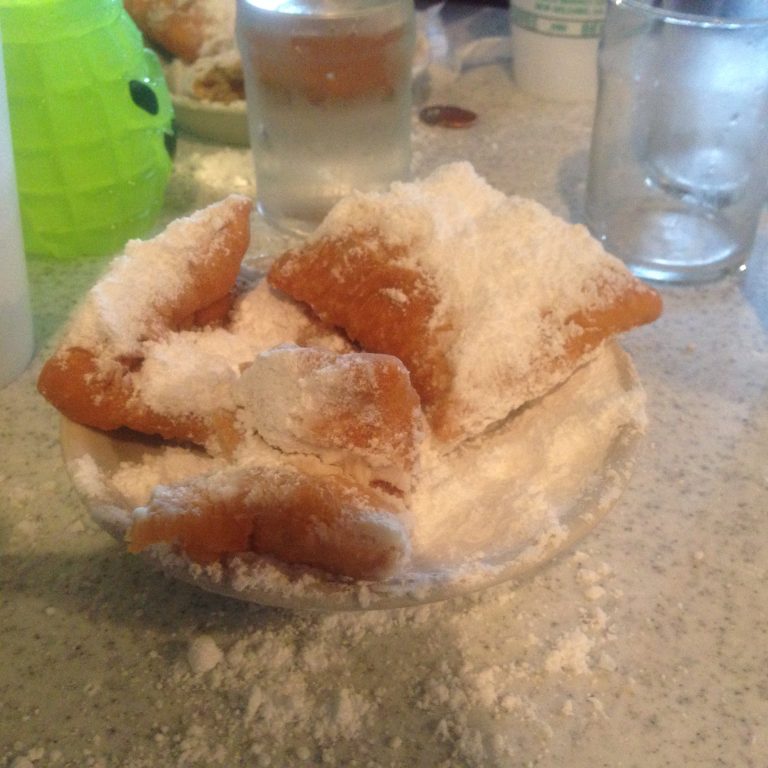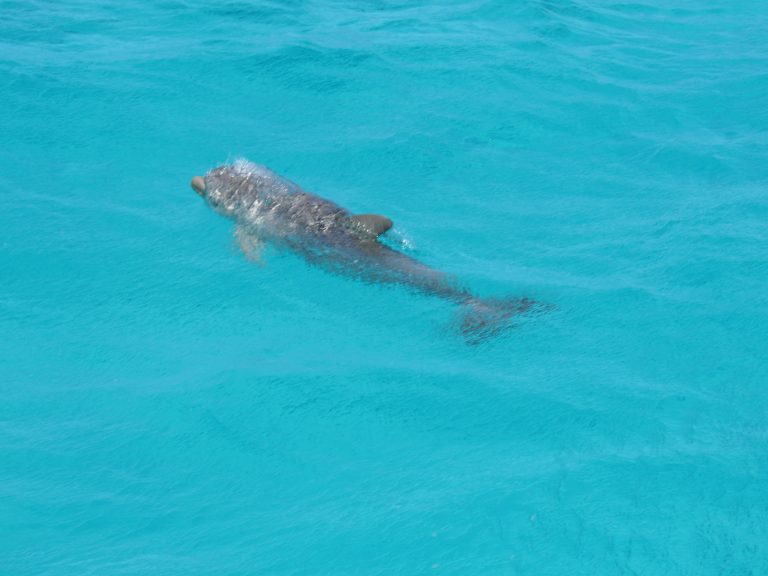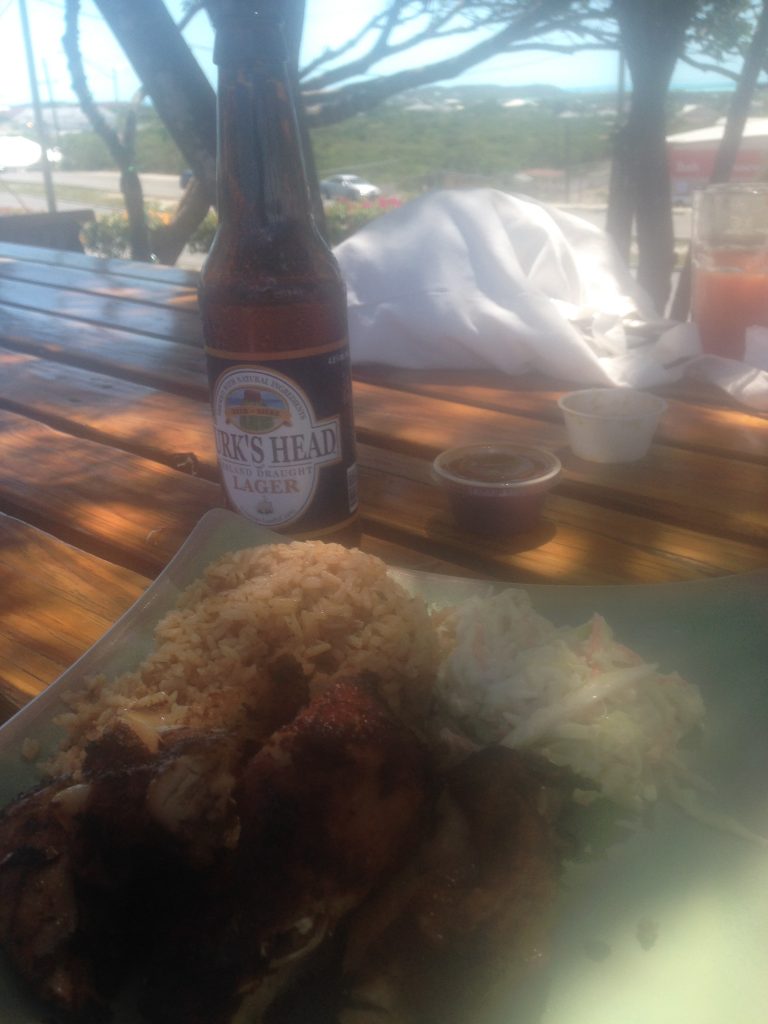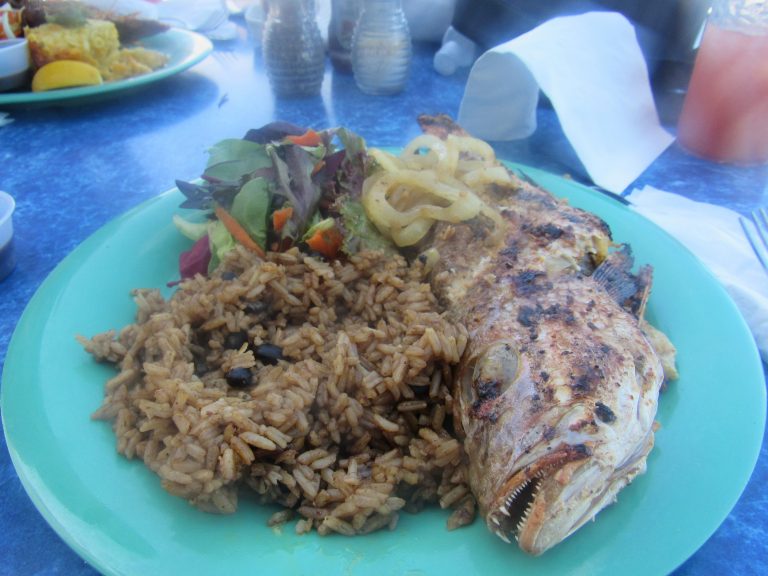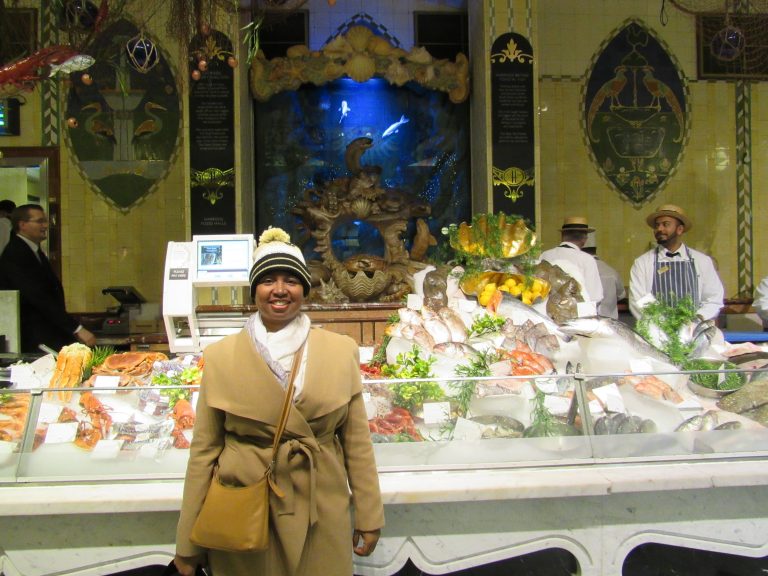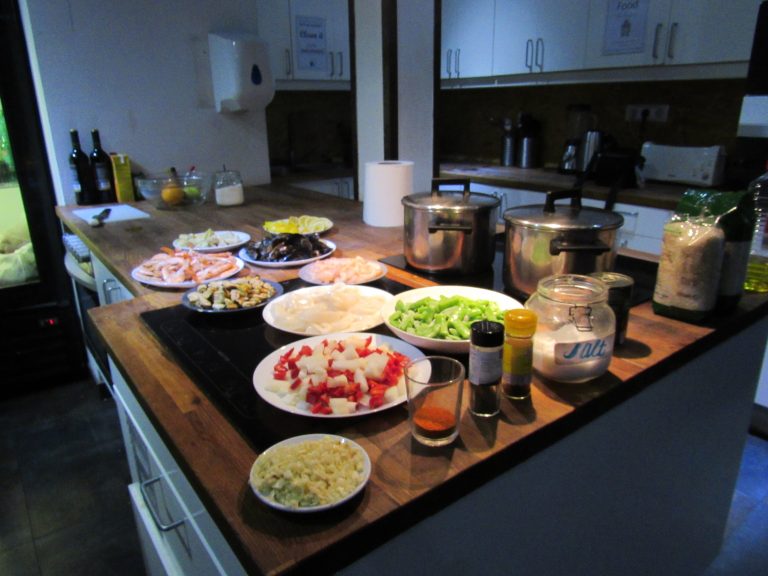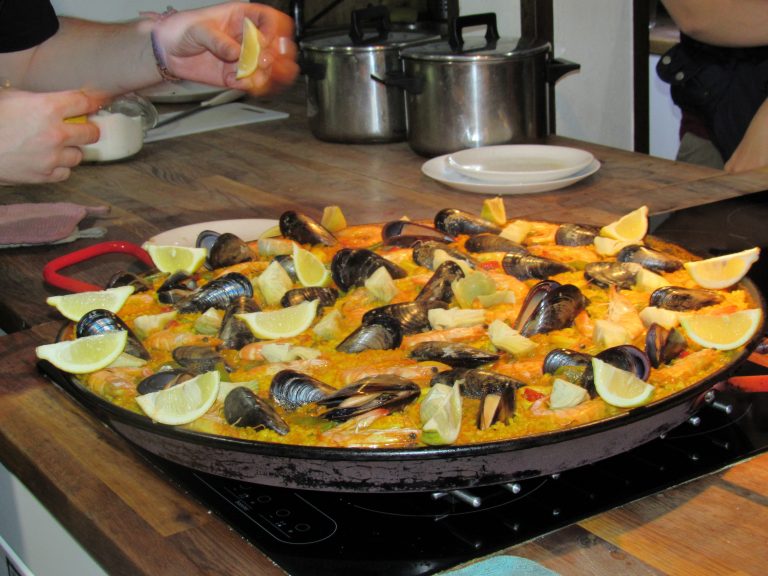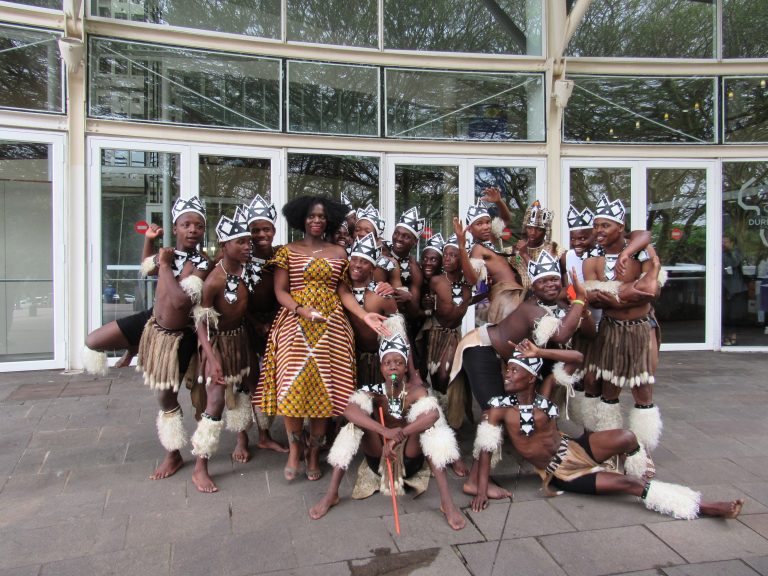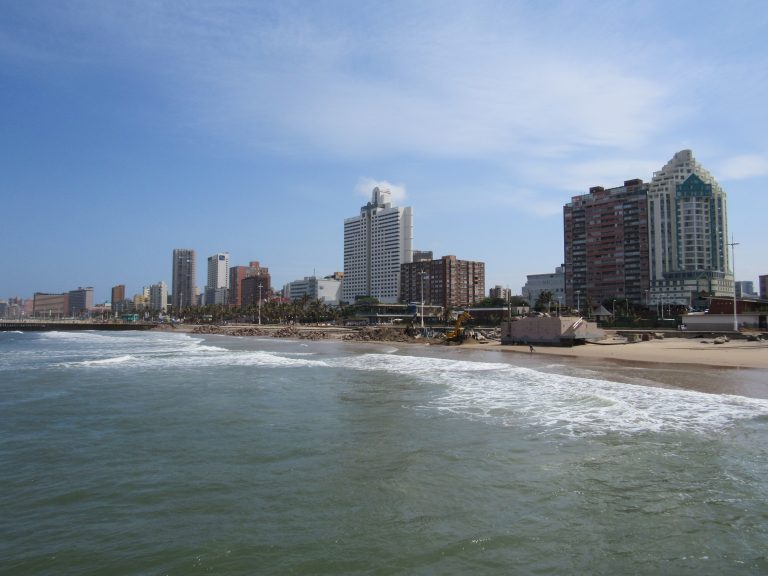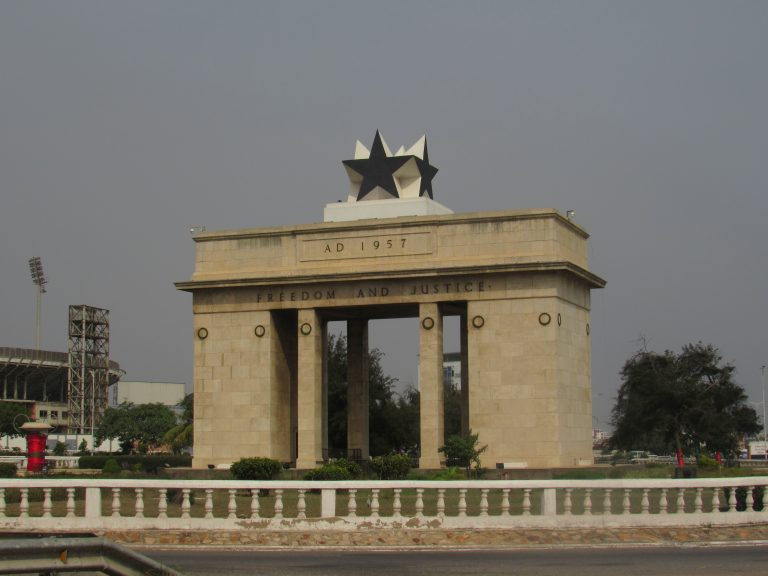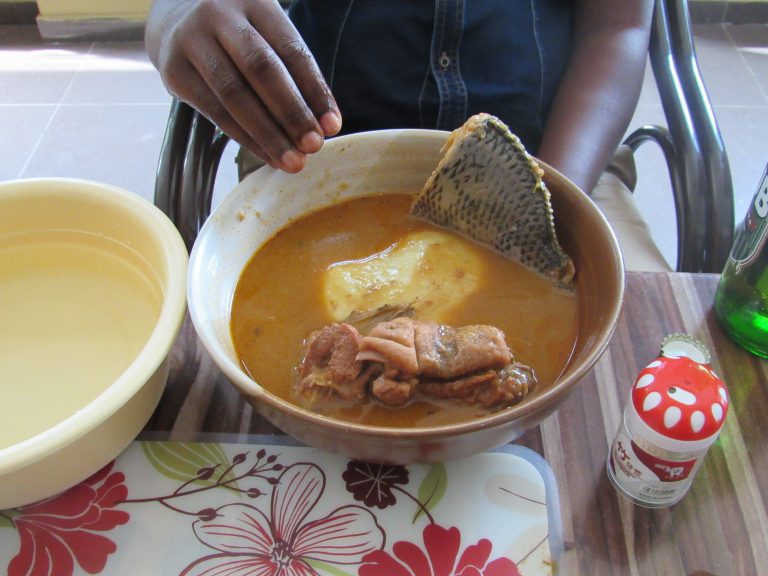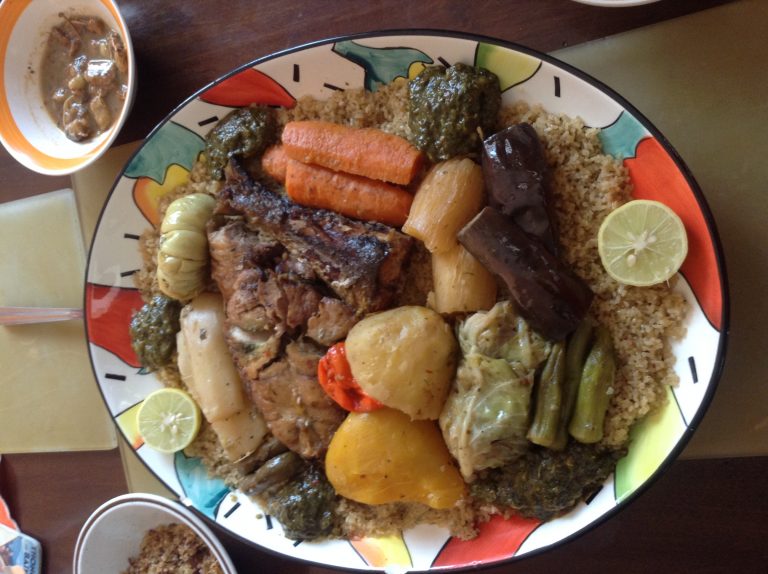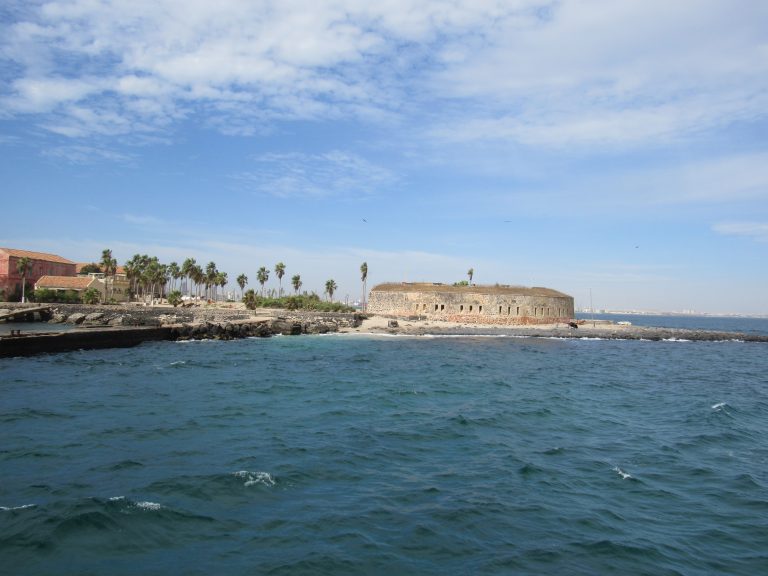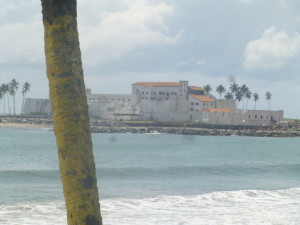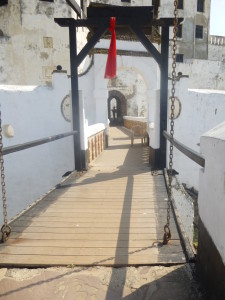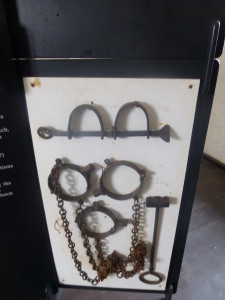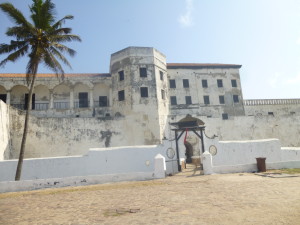My last stop on the African continent was West Africa, namely Ghana. Since this was my first time there and I only had a week, I decided to use a tour operator rather than navigate the country on my own. I decided on Jolinaiko Eco Tours, a Ghana-based company that provides custom tours and also partners with several villages for eco-tourism projects. The price was right and it met my desire that locals benefit from my tourist dollars.
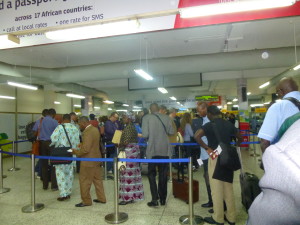
Customs line at Kotoka Int’l Airport (Accra)
I arrived in Accra around 7:30 pm on a Friday night. Two other flights had just arrived before mine, so the line for customs (non-Ghanaians) was extremely long. After about an hour and a half, I finally made it through customs, grabbed my luggage and met my driver Wisdom outside. We packed up and headed to the Sunbird Lodge, Jolinaiko’s bed and breakfast located about 20 minutes away in the suburb of Amrahia; I stayed there overnight before starting my tour. Wisdom was my personal tour guide for the week and I highly recommend him.
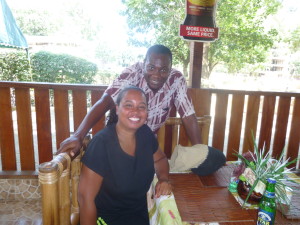
Wisdom and I
I woke up early the next morning to a bright, sunny day. After a homemade breakfast of scrambled eggs, toast and fresh fruit, Wisdom and I headed out for the two-hour drive to the Volta region in eastern Ghana. Along the way, we passed through several small towns where I got a glimpse into daily Ghanaian life. Locals sold clothing, food and other items from roadside stands. Others stood in the road selling a variety of fresh fruit, fried plantain chips (which were delish) and tea bread. I was astonished by the plethora of churches and church-related billboards; clearly, Western Christianity has taken a stronghold in Ghana. I was even more floored by the numerous cell phone ads and stores; it was an odd sight considering the obvious poverty. Wisdom and I had some interesting talks about Ghanaian history, life and culture and his Ewe heritage. Wisdom was very knowledgeable and personable.
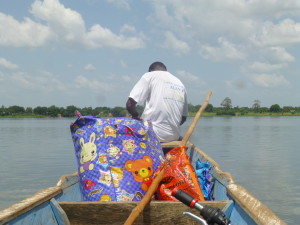 River ferry canoe to Atsiekpoe Village
River ferry canoe to Atsiekpoe Village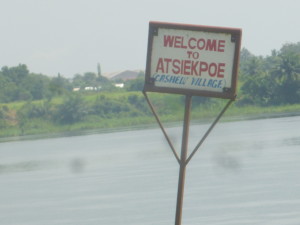
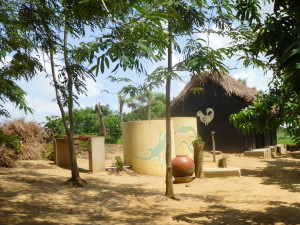
Our first stop was the village of Atsiekpoe (aka Cashew Village). It lies on the Volta river bank and can only be reached by crossing the river on a ferry canoe. After a quick five minute ride, I arrived at the village where several women were washing clothes in the river. I was soon met by my two young tour guides who walked me around the village. They showed me various buildings, houses, and schools, most of which were made of termite clay and covered by grass thatch roofs. I also saw their small herd of goats, the gardens where they grow fruits and vegetables, and how they make handmade tools and charcoal. There was limited electricity and no running water. About halfway through the tour, we stopped at the home of Adawu, the village elder and historian. He welcomed me and invited me into the small hut, where he shared a thorough history of the village. We also talked about his life and work history, as well as mine in the USA. I was amazed by his memory and cognitive abilities, especially after I learned he was 95 years old. We talked for nearly 30 minutes and I felt honored for the experience. Before I left, I asked to take his photo, which he obliged only after putting on his sunglasses (I learned he was blind during our talk, but it wasn’t otherwise obvious). The tour ended at the community museum/tourist center, which had historical information and handmade art, tools, and a 100 year old chief’s stool. I made a donation to the community and said thanks to my tour guides who walked me back to the river. We bid farewell and I took the ferry canoe back across.
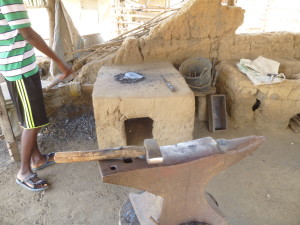 Handmade tools
Handmade tools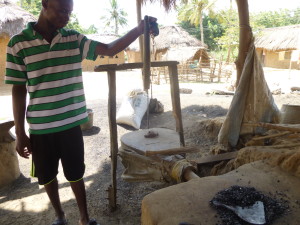
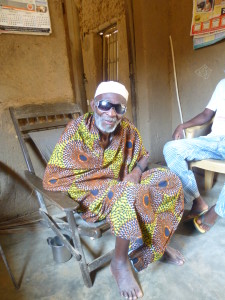
Adawu
In late afternoon, Wisdom and I stopped for lunch at a rest stop where I had the best grilled tilapia I’ve ever had in my life. It was accompanied by Jollof rice, a spicy tomato-based West African rice dish, which was equally delicious. After lunch, we headed to Biakpa, in the eastern highlands of the Volta region. The area is mountainous and our drive included some long narrow, winding roads. But the sun was going down as we arrived and I was treated to beautiful panoramic views of the hills and lush vegetation. The next morning, we went to the village of Amedzofe, which is Ghana’s highest settlement at 2500 feet. I took a brief walking tour with Godwin, the resident Rastafarian and budding author. Over the next few days, I visited several more villages, including Tafi Atome (where I visited their monkey sanctuary and fed bananas to the Mona monkeys), Tafi Abuipe (a kente weaving village), and Kpando (a women’s pottery village). Most of the villages had small homes made of termite clay, and lacked electricity or indoor plumbing. There was a big sense of community, however, as most residents seemed to be related or know each other.
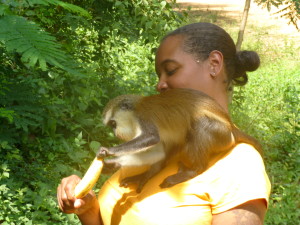 Feeding the monkeys at Tafi Atome village
Feeding the monkeys at Tafi Atome village 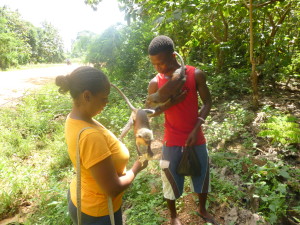
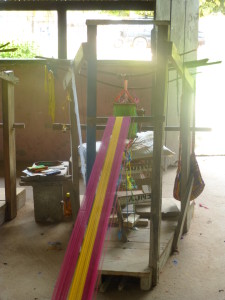 Kente weaver at Tafi Abuipe village
Kente weaver at Tafi Abuipe village
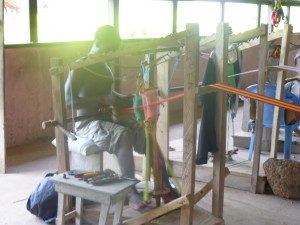
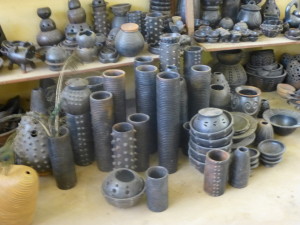 Kpando Women’s Pottery village
Kpando Women’s Pottery village
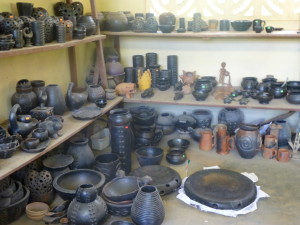 On the day before I left, I went to the Cape Coast to see the infamous slave castles. I took a tour of the Elmina Castle in Elmina; it was an emotionally overwhelming experience and I was glad to get to my hotel, Biriwa Beach, for some rest. For lunch, I had another Ghanaian dish, groundnut soup with chicken and rice balls. It was delicious and filling. I spent the remainder of the day relaxing and meditating with beautiful ocean views and lush greenery in the background. The next morning, we headed back to Accra. On the way we stopped to visit custom coffin makers and a glass bead factory, where they made beautiful hand-made jewelry. I purchased several pieces for myself and as souvenirs. In Accra, I visited tourist highlights in the city, including the National Museum, the Kwame Nkrumah museum and mausoleum, Ghana Judicial Service and government complex, and the W.E.B. DuBois museum. We also stopped at a sales complex, where I purchased a large mud cloth which decoratively hangs on my hallway wall. It’s a beautiful reminder of my time in Ghana.
On the day before I left, I went to the Cape Coast to see the infamous slave castles. I took a tour of the Elmina Castle in Elmina; it was an emotionally overwhelming experience and I was glad to get to my hotel, Biriwa Beach, for some rest. For lunch, I had another Ghanaian dish, groundnut soup with chicken and rice balls. It was delicious and filling. I spent the remainder of the day relaxing and meditating with beautiful ocean views and lush greenery in the background. The next morning, we headed back to Accra. On the way we stopped to visit custom coffin makers and a glass bead factory, where they made beautiful hand-made jewelry. I purchased several pieces for myself and as souvenirs. In Accra, I visited tourist highlights in the city, including the National Museum, the Kwame Nkrumah museum and mausoleum, Ghana Judicial Service and government complex, and the W.E.B. DuBois museum. We also stopped at a sales complex, where I purchased a large mud cloth which decoratively hangs on my hallway wall. It’s a beautiful reminder of my time in Ghana.
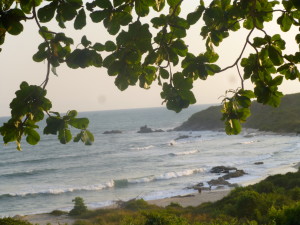 Views of the Atlantic coast outside my room
Views of the Atlantic coast outside my room
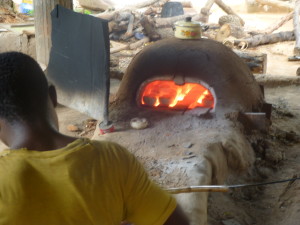 Making glass beads
Making glass beads
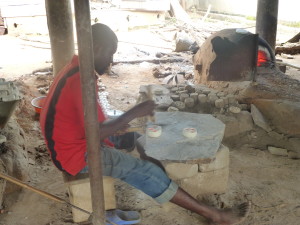 Glass bead jewelry
Glass bead jewelry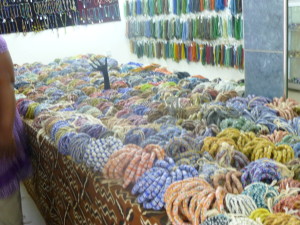
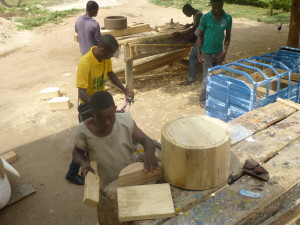 Making custom coffins
Making custom coffins
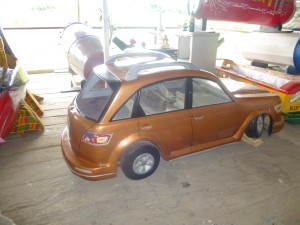 Car coffin
Car coffin
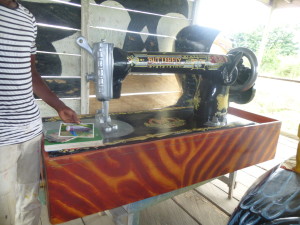 Sewing machine coffin
Sewing machine coffin
I left Ghana glad that I had visited and hopeful that it would one day see the economic success it deserves. There are so many talented, hardworking people that would thrive with just a fraction of the opportunity we have in the USA. Hopefully, more economic development will come in my lifetime.
More Ghana photos
Share This



